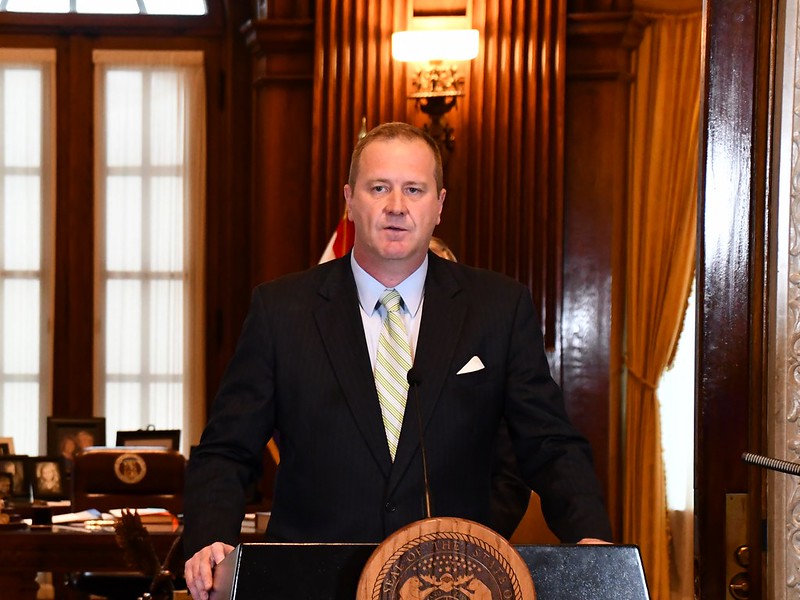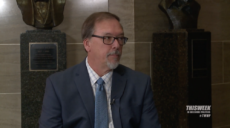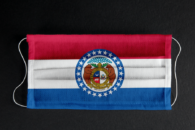Attorney General Eric Schmitt is urging communities to sign on to a settlement with opioid manufacturers, warning millions of dollars for opioid abatement and treatment programs are on the line.
In August, Schmitt agreed to settlement terms from Johnson & Johnson and other distributors including McKesson, AmerisourceBergen, and Cardinal Health that could funnel more than $500 million into an opioid abatement and treatment fund overseen by the Mental Health, Social Services, Health and Senior Services, and Public Safety departments.
The case is one of the largest victim-centric settlements in Missouri, Schmitt said.
To receive the full allotment, every community must sign on to the settlement. Chris Nuelle, a spokesman for the attorney general, said the deadline was Jan. 3, 2022.
Schmitt joined a roundtable with health care providers at Burrell Behavioral Health in Columbia Tuesday afternoon to address the settlement and his office’s outreach efforts. He said a handful of communities in the area hoping to pursue their own legal challenges were among the holdouts, though he was optimistic they would sign on.
“This is a once-in-a-generation opportunity to have resources available for the people who are fighting addiction,” Schmitt said. “Our interests are aligned. There’s no money for the state here: The money that comes in is essentially applied for and goes to local communities.”
Schmitt committed to “aggressively engage” municipalities through his office’s “Fighting Addiction, Saving Lives” initiative. The project was launched to encourage counties and political subdivisions to sign onto the settlement through press events, social media campaigns, and weekly sign-on tracking.
Schmitt said Missouri was one of the few states to pursue the matter without the use of outside counsel, allowing it to funnel as much of the allocation into the programs as possible.
In total, 44 states agreed to the terms of the distributors’ settlements by the Aug. 21 deadline.
Johnson & Johnson will pay out $5 billion total to the states that agreed to the terms, while the other distributors will be on the hook for $21 billion over an 18-year period.
Johnson & Johnson agreed to stop selling opioids entirely and will not fund any third parties’ promotion of opioids. The others have agreed to report and ban the shipping of suspicious opioid orders, establish data-driven systems to detect suspicious orders from pharmacies, and block customer pharmacies from receiving shipments if they show signs of diversion, according to the Attorney General’s Office.
In a previous statement, Johnson & Johnson maintained the company’s actions related to the promotion and marketing of prescription opioids were “appropriate and responsible.”
“We recognize the opioid crisis is a tremendously complex public health issue, and we have deep sympathy for everyone affected. This settlement will directly support state and local efforts to make meaningful progress in addressing the opioid crisis in the United States,” Michael Ullmann, the executive vice president and general counsel of Johnson & Johnson, said.
Amerisource Bergen, Cardinal Health, and McKesson also said they “strongly dispute” the lawsuits but supported the settlement as “important steps toward achieving broad resolution of governmental opioid claims and delivering meaningful relief to communities across the United States.”
More than 1,100 Missourians died from opioid-related causes in 2018, meaning one in every 56 deaths that year was opioid-related, according to the Department of Health and Senior Services (DHSS). The previous year, one in every 65 deaths was related to opioids.
Opioid-related deaths continue to be an issue in the Columbia area with half of this year’s deaths by fentanyl occurring since August, according to Burrell Behavioral Health Central Region President Matt Gass.

Cameron Gerber studied journalism at Lincoln University. Prior to Lincoln, he earned an associate’s degree from State Fair Community College. Cameron is a native of Eldon, Missouri.
Contact Cameron at cameron@themissouritimes.com.







































